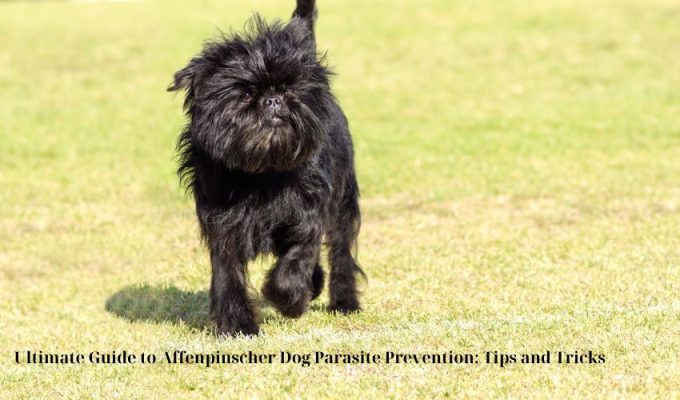Learn how to spot allergies in Affenpinscher dogs with this complete guide for pet owners.
Common Allergies in Affenpinscher Dogs
Affenpinschers are prone to a variety of allergies, which can cause discomfort and health issues for your furry friend. Some common allergies in Affenpinschers include:
Atopy
Atopy is a skin allergy that often affects Affenpinschers. It can cause itching, redness, and irritation in areas such as the feet, belly, skin folds, and ears. Symptoms typically start between the ages of one and three and can worsen over time. Treatment options are available to help manage this condition and alleviate your dog’s discomfort.
Food Allergies
Affenpinschers can also develop food allergies, which may cause digestive issues, skin problems, and itching. Identifying and eliminating the specific food allergen from your dog’s diet can help manage this type of allergy. Working with your veterinarian to conduct a food trial or allergy testing can help pinpoint the culprit and create a suitable diet plan for your Affenpinscher.

Environmental Allergies
Environmental allergens such as pollen, mold, and dust can trigger allergic reactions in Affenpinschers. Common symptoms include itching, skin irritation, and recurrent ear infections. Managing environmental allergies may involve minimizing exposure to triggers, using allergy medications, and implementing skin care routines to soothe your dog’s skin.
It’s important to work closely with your veterinarian to identify and address any allergies affecting your Affenpinscher. By understanding and managing these allergies, you can help your furry companion live a more comfortable and healthy life.
Environmental Allergies
Environmental allergies, also known as atopy, can cause your Affenpinscher to experience itching and discomfort. Common triggers for environmental allergies include pollen, mold, and dust. These allergens can lead to symptoms such as itching, redness, and inflammation of the skin. Affenpinschers are often affected on their feet, belly, folds of the skin, and ears. Symptoms typically start between the ages of one and three and can worsen over time.
Treatment Options
There are many treatment options available for environmental allergies in Affenpinschers. Your veterinarian may recommend antihistamines, corticosteroids, or allergy shots to help manage your dog’s symptoms. Additionally, keeping your home clean and free of dust and mold can help reduce your dog’s exposure to allergens.
Preventive Measures
To prevent environmental allergies in your Affenpinscher, you can take steps to minimize their exposure to common allergens. This may include regular grooming to remove pollen and dust from their coat, keeping their bedding and living areas clean, and avoiding outdoor activities during peak pollen seasons.
By addressing environmental allergies in your Affenpinscher, you can help ensure that they remain comfortable and free from the itching and discomfort associated with these common allergens.
Food Allergies
Food allergies in Affenpinschers can cause a variety of symptoms, including itching, digestive issues, and skin problems. Common food allergens for dogs include beef, dairy, wheat, egg, chicken, lamb, soy, pork, rabbit, and fish. If you suspect your Affenpinscher has a food allergy, it’s important to work with your veterinarian to identify the specific allergen and make necessary dietary changes.
Symptoms of Food Allergies
– Itching, especially around the face, feet, and ears
– Digestive upset, such as vomiting or diarrhea
– Skin rashes or hives
– Chronic ear infections
– Hair loss or thinning coat
If you notice any of these symptoms in your Affenpinscher, it’s important to seek veterinary care for proper diagnosis and treatment. Your vet may recommend an elimination diet or allergy testing to determine the specific allergen causing your dog’s symptoms.
Managing Food Allergies
Once the specific food allergen is identified, your vet will work with you to create a customized diet plan for your Affenpinscher. This may involve avoiding certain ingredients and choosing hypoallergenic or limited ingredient diets. It’s important to carefully read ingredient labels on commercial dog foods and treats to ensure they do not contain the allergen.
In some cases, your vet may recommend a prescription or veterinary therapeutic diet to manage your dog’s food allergies. It’s essential to follow your vet’s recommendations and avoid feeding your Affenpinscher any foods that could trigger an allergic reaction.
Skin Allergies
Skin allergies, also known as atopic dermatitis, are a common issue for Affenpinschers. These allergies can be caused by a variety of environmental factors such as pollen, mold, or dust. Affens may experience itching, redness, and irritation of the skin, particularly in areas like the feet, belly, skin folds, and ears. These symptoms typically begin to manifest between the ages of one and three and can worsen over time. It’s important to seek treatment for skin allergies to provide relief for your dog and prevent secondary infections.
Treatment Options
There are several treatment options available for managing skin allergies in Affenpinschers. Your veterinarian may recommend antihistamines, corticosteroids, or other medications to alleviate the itching and inflammation. Additionally, topical treatments such as medicated shampoos or sprays can help soothe the skin and reduce irritation. Identifying and avoiding specific allergens may also be part of the treatment plan.
Preventive Measures
In some cases, environmental modifications can help prevent skin allergies in Affenpinschers. This may include regular bathing to remove allergens from the skin and coat, as well as keeping the living environment clean and free from dust and mold. Your veterinarian can provide guidance on how to minimize your dog’s exposure to potential allergens.
Other Potential Allergies
Some Affenpinschers may also be prone to food allergies, which can manifest as itching, redness, and skin irritation. It’s important to monitor your dog’s diet and consult with your veterinarian if you suspect a food allergy.
Common Allergens for Affenpinschers:
– Chicken
– Beef
– Dairy
– Wheat
– Soy
It’s also important to be mindful of environmental allergens such as pollen, dust, and mold, which can also trigger allergic reactions in Affenpinschers. Regular grooming and keeping your dog’s living environment clean can help minimize exposure to these allergens. If your dog shows signs of allergies, such as excessive itching or skin irritation, consult with your veterinarian to determine the best course of action.
Conclusion
Overall, caring for your Affenpinscher requires attention to their specific genetic predispositions and health concerns. By being aware of these potential issues, you can work with your veterinarian to create a preventive health plan that will keep your furry friend happy and healthy for years to come. Regular dental care, vaccinations, parasite prevention, and spaying/neutering are all important aspects of maintaining your Affenpinscher’s well-being.
It’s also crucial to monitor your dog for any signs of discomfort, such as lameness, eye problems, or skin allergies, and seek veterinary care as soon as any issues arise. With proper attention and care, you can ensure that your Affenpinscher lives a long and fulfilling life as your faithful companion.
Key Takeaways:
- Regular dental care is essential for preventing dental disease, which is common in Affenpinschers.
- Vaccinations and parasite prevention are crucial for maintaining your dog’s overall health and well-being.
- Monitoring for genetic predispositions such as hip dysplasia, eye conditions, and skin allergies can help catch and address potential issues early on.
- Spaying/neutering not only prevents unwanted pregnancies but also reduces the risk of certain types of cancers in your Affenpinscher.
In conclusion, it is important for Affenpinscher dog owners to be observant of their pet’s behavior and physical symptoms to spot potential allergies. Regular vet check-ups and dietary adjustments can help manage any allergic reactions and ensure the dog’s overall health and well-being.




